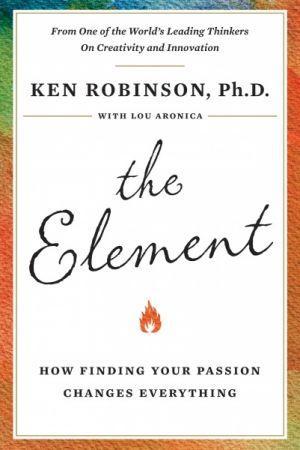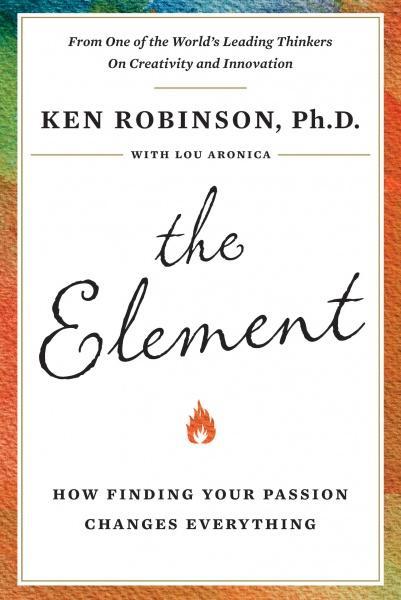Thoughts on Ken Robinson’s self-help tome about finding our purpose in life.

It is not uncommon for us to ask ourselves sometimes, “Is this all there is to life?” We’ve heard countless laments –whether from others, or laments of our own — on how life can get so monotonous, where work is a drag, and day in day out, it seems as though we are stuck in a rut, doing the same thing without much contentment or fulfillment. It is usually at this stage where we begin to wonder about our life’s purpose and the meaning to our existence. Ken Robinson, in his book The Element proposes that this frustration exists because we have yet to reach our Element. Robinson then goes on to expand on this idea and provides examples of people who have recognized their Element and made a successful living doing what they love. The author also highlights how we can find our Element and how this would enable us to “reconnect with our true self” and achieve happiness.
First and foremost, what exactly is this Element? Robinson describes this as “the meeting point between natural aptitude and personal passion”. Being in the Element will apparently take you beyond ordinary experiences of enjoyment or happiness because when we are in the Element, we connect with something fundamental to our sense of identity, purpose, and well-being. Thus, we are unveiled to a sense of revelation of whom we really are and what we’re meant to do in this lifetime, thereby answering the question of the meaning of life. Now, this all sounds pretty good right? But let’s just stop here for a second. With the whole idea of ‘The Element’, Robinson makes the assumption that:
Every individual is programmed with a particular trait that once discovered, and thus moving us towards our Element, will give us fulfillment and a sense of meaning in life.
I happen to disagree with this. Why should it be assumed that there is something inherent within us that, once untapped, will provide an answer to our purpose in life? What Robinson feeds us is hope. A hope that there is something more to our mundane lives; a hope that we have been born for a particular purpose inherent in our DNA; a hope that happiness will be guaranteed once we “truly discover” ourselves. Robinson then narrates throughout the book success stories of people who have found their Element and how they have moved on to achieve great things in their particular field: Paul McCartney (from The Beatles), Matt Groening (creator of The Simpsons) and Sir Richard Branson (founder of the Virgin Group), to name a few.
Robinson, to his credit, warns us that finding our Element is not easy. It is a combination of talent, opportunity, luck, supportive mentors, and overcoming extraordinary societal and familial pressures in some cases. Towards the end of the book, as though it were some sort of saving grace, Robinson then adds that it is not necessary to make your Element your life career. In other words, one could have a normal (mundane) day job, but still be able to connect with your Element (which would be your side hobby/job), and you would still find contentment and fulfillment. However, I am of the opinion that what Robinson describes cannot be said to apply generally to every individual. It is akin to zodiac reading, where out of the billions of people on earth, a particular zodiac description would inevitably fit a certain number of people.
Thus is the same with this finding of our Element. Some of us will no doubt find contentment and fulfillment in doing the things that we love and have a natural aptitude for. But in reality, some of us would have a natural inclination towards certain skills, like drawing or writing or cooking, while other skills would gradually be honed and developed. A natural aptitude for something in particular then does not necessarily mean that the skill in question is something for which you would feel passionately for. Passion on the other hand is trickier. How does passion develop and through what circumstances? Is it a reaction towards particular events in our life, or is it something inherent – a we-will-know-it-when-we-see-it kind of thing? Rather than calling the fusion of natural aptitude and passion “The Element”, I would simply term it as something for which we feel strongly for – be it a particular instrument, working in a particular field, like education, the creative arts, etc – andwhich we are willing to put effort, dedication and hard work in.
Robinson offers many practical lessons which I do not dispute—ranging from the ability to recognise and take control of opportunities, creating our own luck, having mentors and the right people in our life, and taking the courage to step out from our comfort zones. However, his premise that in finding the Element will lead to “true self discovery” is something I do not agree with. I belief that there is no such thing as a “true self” that is to be discovered – we invent ourselves day in and day out in the choices that we make and the ideas we believe in, and this is fluid; it is not something inherent within each one of us — it is something conditioned and affirmed throughout our lives and our self is constantly being shaped by our interaction with the world.
By that same token, our passions are not inherent. All of us like and love many things, but it is a passion when we begin to take control and develop it into something significant in our lives. Which is why most often, a passion will more likely turn into a life career—because you have chosen to put hard work and dedication into turning what you really love into something you do everyday. Hence, the Element is not something which we “uncover” or “discover” within ourselves – it is simply something we really like/love and have taken steps to pursue it further than most people would. The burden is not in trying to discover your Element; the trick is simply to create it: to decide what it is you love to do, and whether you have enough desire and courage to pursue it on a more significant scale. It is a practical and calculated step, rather than bemoaning about the lack of fulfilment in our lives.

